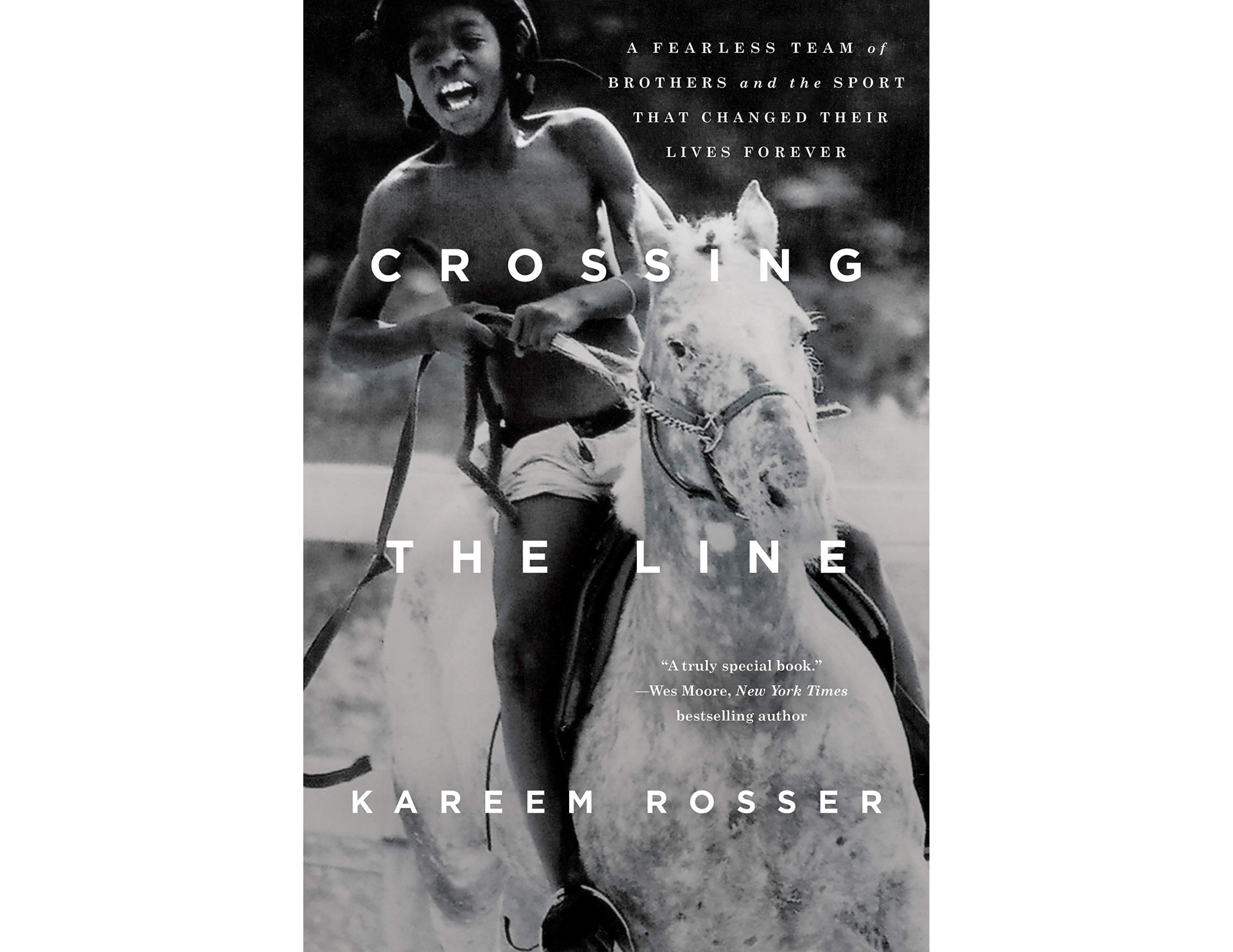When a ball is hit in polo, its path creates an imaginary line down the field that cannot be crossed. This rule keeps players moving toward the ball and prevents their horses from colliding. In the memoir Crossing the Line, author Kareem Rosser reveals his journey from The Bottom, an impoverished and underserved neighborhood in West Philadelphia, to the National Interscholastic Polo Championship. “Crossing the line” transforms from a polo safety precaution to a metaphor for overcoming institutionalized barriers that were structured to keep Rosser in The Bottom. He is rescued from this fate by Philadelphia’s Work to Ride stables in Fairmount Park and his coach Lezlie Hiner. It is through riding that Rosser realizes he holds the reins to his future.
The author shares several traumatic events from his childhood that deeply affected his understanding of the world. The innocence of Rosser’s youth creates a discordance between him and the violence of his world. He details his experience with anxiety that was triggered by his environment. When he and his brothers discover Work to Ride, horse riding becomes his outlet. Rosser describes feeling fully in control of his thoughts while riding because any distraction can cause you to lose complete control of your animal. Riding restored a sense of power that he never felt over his own life. This memoir is a beacon of light for the youth that are surrounded by drugs and death as Rosser was in his childhood. His story gives them hope for salvation.
The pages are plastered with moments from Rosser’s life that kept him from the quicksand of street life that claimed many of the boys he grew up with. For the majority of the narrative, Rosser is a child. This perspective shines a whimsical, magical light on the horses and makes the stable feel like a paradise on Earth for him and his brothers. The boys’ imaginations are wholesome. They dream of being a champion polo team, owning a farm, and living a quiet life with their family. They dream of the polo horses carrying them far from the streets of Philadelphia. They dream that polo will reunite their family. This dream ultimately comes true and Rosser rides his horse, Cholo, out of The Bottom.
This book is easily digestible for readers who aren’t familiar with the game of polo. Rosser explains the matches in vivid sensory detail and we feel as though we are riding alongside him. Rosser uses language that is not overly technical and includes an appendix for readers who want to learn the game before reading.
Rosser maintains a humble demeanor from the very first chapter. Rather than solely telling his story, he details the lives of his family and friends. He makes it evident that he would not have reached his level of success without the love and support of the people around him. One of these people is Lezlie Hiner, the founder of Work to Ride and Rosser’s first polo coach. She incentivized the kids at the barn to stay in school by allowing them to ride for good behavior and taking away the horses if they didn’t make the effort. Hiner still operates Work to Ride today, providing Philadelphia youth a safe haven in their neighborhood.
Rosser addresses the animosity he felt as a black child from the inner city playing a traditionally rich, white man’s sport. He describes the process of learning their language and mannerisms so he could fit into their world and receive more opportunities. When he first starts playing for the Work to Ride team, they struggle to be taken seriously and often lose by significant margins.
When given the opportunity to train horses on a remote farm in Connecticut, Rosser finds a sanctuary where he is able to do what he loves most. One summer, he brings his brother Gerb to Connecticut where the two ride together from dawn till dusk. By the end of the summer, they are completely in sync and able to anticipate the other’s next move from a twitch of the arm. They also learn each other’s strengths and weaknesses on horseback, which allows them to coordinate their plays accordingly. This bond strengthens the team and leads them to the National Interscholastic Polo Championship.
Rosser promised Hiner that if he ever had the opportunity to leave Philadelphia, he would take it and not look back. Rosser graduated from Colorado State University in 2016 after winning the Collegiate Polo National Championship and receiving the Intercollegiate Polo Player of the Year Award. Since then, he has returned to Philadelphia and currently works as a financial analyst and operates the fundraising branch of Work to Ride. Philadelphia is his home, and he cherishes the Work to Ride program for all that it has done for him and what it continues to do for kids in Philadelphia. Kareem Rosser and Work to Ride have paved the way for black youth in polo and continues to show them the path to a brighter future.
Visit Kareem Rosser’s website and purchase his book here.
Crossing the Line
Kareem Rosser
St. Martin’s Press
Published on February 9, 2021
304 pp.

Diamond Warney is a second-year Drexel student studying English and Law. She enjoys reading poetry and watching low-budget horror movies. After graduation, she hopes to earn her J.D. and work in immigration law.
